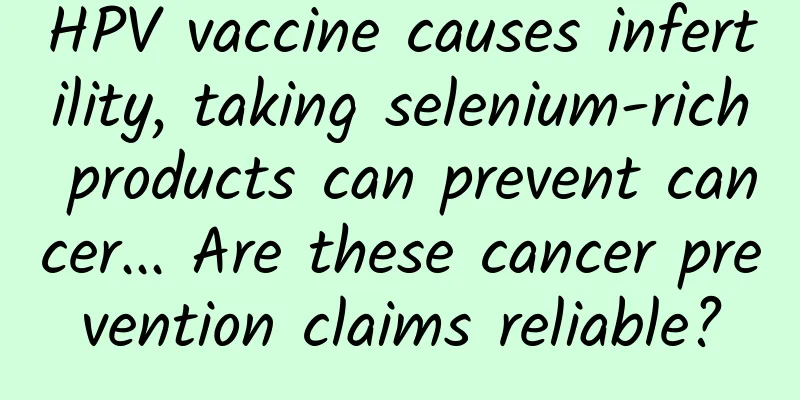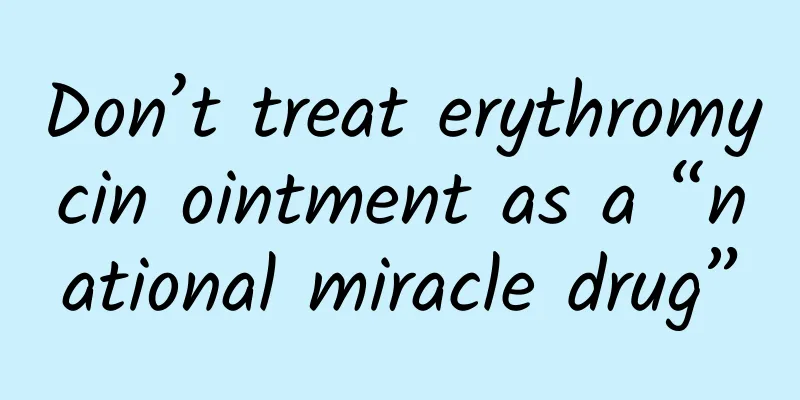HPV vaccine causes infertility, taking selenium-rich products can prevent cancer... Are these cancer prevention claims reliable?

|
The World Health Organization once proposed that one-third of cancers are completely preventable. A large number of studies have confirmed that changing unhealthy lifestyles, staying away from carcinogens, getting vaccinated, and maintaining an optimistic attitude can reduce the risk of cancer to a certain extent. However, there are many different opinions on cancer prevention on the Internet. "Human papillomavirus (HPV) vaccines can lead to decreased fertility or infertility", "You can't dye your hair, hair dyes can cause cancer", "Taking selenium-rich products and selenium supplements can prevent cancer"... Are these statements correct? Myth 1: HPV vaccines cause decreased fertility or infertility Expert response: HPV vaccine does not affect reproductive system function Among the most common cancers in women, the incidence of cervical cancer is second only to breast cancer. However, cervical cancer is currently the only cancer with a clear cause. High-risk HPV infection is the main cause of cervical cancer. Therefore, in the three-level prevention strategy for cervical cancer, HPV vaccination is the first step. However, there are claims on the Internet that HPV vaccination may lead to a decrease in fertility or even infertility. In this regard, Wang Jianmei, director of the Assisted Reproduction Center of the Second Hospital of Tianjin Medical University, said that according to the comprehensive research report of the World Health Organization's Vaccine Safety Committee, HPV vaccines have been proven to be safe and effective, and no direct causal relationship has been found between them and infertility. "The main component of the HPV vaccine is virus-like particles, which can stimulate the immune system to produce antibodies and provide protection without affecting the function of the reproductive system." Wang Jianmei introduced, "Many research results show that HPV vaccination does not increase the risk of ovarian insufficiency or infertility in women." In addition, public health departments in various countries are continuously testing the safety of HPV vaccines, and once potential problems are found, they will immediately investigate and take appropriate measures. Myth 2: Don’t dye your hair to prevent cancer Expert response: It is safe to use qualified products to dye your hair moderately Hair dyeing has become one of the ways for many people to change their appearance. However, people often hear that if you want to prevent cancer, you should not dye your hair because hair dyes contain carcinogens. Wang Huaqing, director of the Tumor Diagnosis and Treatment Center of Tianjin People's Hospital and professor of Nankai University School of Medicine, said that current research results show that there is no definite positive correlation between using qualified hair dyes and moderate hair dyeing and the incidence of cancer. The view that hair dyeing can cause cancer mainly stems from the fact that hair dyes often contain the chemical component p-phenylenediamine. Wang Huaqing said that frequent exposure to high concentrations of p-phenylenediamine may indeed have a certain risk of cancer. "However, there is currently no conclusive evidence that moderate hair dyeing will directly cause cancer, and hair dyes sold on the market need to comply with national or regional safety standards and are safe for moderate use under normal conditions," said Wang Huaqing. He suggested that the interval between hair dyeing should be kept at about 4 months; wear gloves when dyeing hair to reduce the chance of skin contact with hair dye and avoid inhaling hair dye vapor; and conduct a skin sensitivity test before using a new product for the first time to ensure that there will be no allergic reaction. Myth 3: Taking selenium-rich products and selenium supplements can prevent cancer Expert response: Selenium supplementation does not reduce cancer risk Selenium is an essential trace element for the human body, which has biological effects such as anti-oxidation and supporting immune system function. In recent years, studies have pointed out that the intake of selenium is negatively correlated with the incidence of certain cancers. Therefore, it is said that taking selenium-rich products and selenium supplements can prevent cancer. Wang Huaqing introduced that selenium is an important component of antioxidant enzymes such as glutathione peroxidase, which helps to remove free radicals in the body and reduce the damage of oxidative stress to cells. Some epidemiological studies have shown that selenium is associated with cancer. For example, lower selenium intake may increase the risk of gastric cancer, colon cancer, liver cancer and other cancers. "Although these observational studies have revealed that selenium deficiency may be positively correlated with cancer risk, multiple randomized controlled trials have not proven that selenium supplements can clearly reduce the risk of cancer," said Wang Huaqing. He reminded that moderate intake of selenium is good for health, but excessive intake may lead to selenium poisoning or other health risks. The recommended daily intake of selenium for adults is about 55 micrograms, and more than 400 micrograms is considered excessive intake. Therefore, unless under the doctor's advice, it is not recommended to use selenium supplements in life to prevent cancer. "The safest way to get selenium through diet. Foods rich in selenium include Brazil nuts, meat, fish, grains and eggs," said Wang Huaqing. Chen Xi |
>>: The higher the SPF of sunscreen, the better the sun protection effect?
Recommend
What vegetables can reduce internal heat? The first one is this
Getting angry is a very common symptom in life, w...
Can infertility be detected during a premarital checkup?
Premarital check-up is a physical examination tha...
What dishes should be stir-fried with garlic and what dishes should not be stir-fried with garlic
We all know that garlic is a common ingredient, a...
Small tumor inside the nipple
Some women also experience many changes in their ...
How long after a cervical biopsy can I have sex?
Cervical puncture biopsy belongs to a new item of...
Excessive exercise causes seven major harms to women
Exercise is something that modern people are very...
What are the advantages and disadvantages of moxibustion during menstruation?
Moxibustion is a very traditional Chinese medical...
How to cure the second degree of cervical erosion
In life, many women are troubled by gynecological...
What causes uterine inflammation?
For women, the uterus is the place where children...
How to pay attention to menopause
Due to the special physiological structure of the...
What do major social apps look like in the minds of American teenagers?
There is a whole social science fallacy that make...
As winter and spring arrive, respiratory diseases are prevalent. What should the elderly do?
This is the 4759th article of Da Yi Xiao Hu The C...
There are so many antihypertensive drugs. How should patients with chronic kidney disease and hypertension choose?
Hypertension is one of the common complications o...
Whether your period is normal is not only related to the uterus, but also controlled by the brain
Author: Hao Yanfang, Chinese Academy of Medical S...









